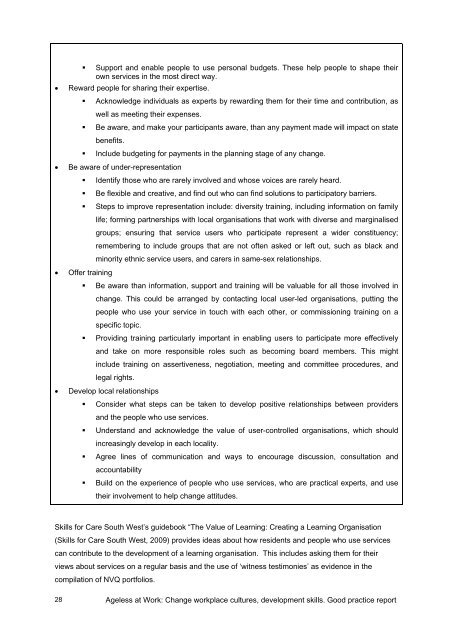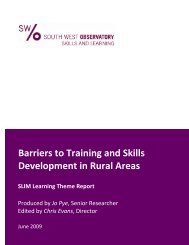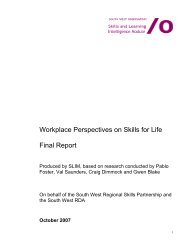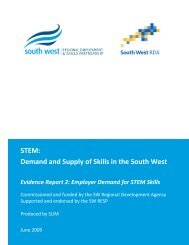Ageless at Work - Skills for Care
Ageless at Work - Skills for Care
Ageless at Work - Skills for Care
You also want an ePaper? Increase the reach of your titles
YUMPU automatically turns print PDFs into web optimized ePapers that Google loves.
• Support and enable people to use personal budgets. These help people to shape their<br />
own services in the most direct way.<br />
Reward people <strong>for</strong> sharing their expertise.<br />
• Acknowledge individuals as experts by rewarding them <strong>for</strong> their time and contribution, as<br />
well as meeting their expenses.<br />
• Be aware, and make your participants aware, than any payment made will impact on st<strong>at</strong>e<br />
benefits.<br />
• Include budgeting <strong>for</strong> payments in the planning stage of any change.<br />
Be aware of under-represent<strong>at</strong>ion<br />
• Identify those who are rarely involved and whose voices are rarely heard.<br />
• Be flexible and cre<strong>at</strong>ive, and find out who can find solutions to particip<strong>at</strong>ory barriers.<br />
• Steps to improve represent<strong>at</strong>ion include: diversity training, including in<strong>for</strong>m<strong>at</strong>ion on family<br />
life; <strong>for</strong>ming partnerships with local organis<strong>at</strong>ions th<strong>at</strong> work with diverse and marginalised<br />
groups; ensuring th<strong>at</strong> service users who particip<strong>at</strong>e represent a wider constituency;<br />
remembering to include groups th<strong>at</strong> are not often asked or left out, such as black and<br />
minority ethnic service users, and carers in same-sex rel<strong>at</strong>ionships.<br />
Offer training<br />
• Be aware than in<strong>for</strong>m<strong>at</strong>ion, support and training will be valuable <strong>for</strong> all those involved in<br />
change. This could be arranged by contacting local user-led organis<strong>at</strong>ions, putting the<br />
people who use your service in touch with each other, or commissioning training on a<br />
specific topic.<br />
• Providing training particularly important in enabling users to particip<strong>at</strong>e more effectively<br />
and take on more responsible roles such as becoming board members. This might<br />
include training on assertiveness, negoti<strong>at</strong>ion, meeting and committee procedures, and<br />
legal rights.<br />
Develop local rel<strong>at</strong>ionships<br />
• Consider wh<strong>at</strong> steps can be taken to develop positive rel<strong>at</strong>ionships between providers<br />
and the people who use services.<br />
• Understand and acknowledge the value of user-controlled organis<strong>at</strong>ions, which should<br />
increasingly develop in each locality.<br />
• Agree lines of communic<strong>at</strong>ion and ways to encourage discussion, consult<strong>at</strong>ion and<br />
accountability<br />
• Build on the experience of people who use services, who are practical experts, and use<br />
their involvement to help change <strong>at</strong>titudes.<br />
<strong>Skills</strong> <strong>for</strong> <strong>Care</strong> South West’s guidebook “The Value of Learning: Cre<strong>at</strong>ing a Learning Organis<strong>at</strong>ion<br />
(<strong>Skills</strong> <strong>for</strong> <strong>Care</strong> South West, 2009) provides ideas about how residents and people who use services<br />
can contribute to the development of a learning organis<strong>at</strong>ion. This includes asking them <strong>for</strong> their<br />
views about services on a regular basis and the use of ‘witness testimonies’ as evidence in the<br />
compil<strong>at</strong>ion of NVQ portfolios.<br />
28<br />
<strong>Ageless</strong> <strong>at</strong> <strong>Work</strong>: Change workplace cultures, development skills. Good practice report








